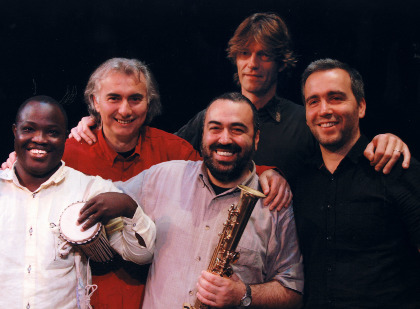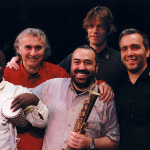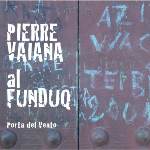- country:Belgium
- region:Mediterranean
- style(s):Mediterranean, World
- label:Sowarex / Igloo Records
- type:Band, Composer/Songwriter
- gender:male
- instrumentation:instrumental, vocal
- artist posted by:Sowarex / Igloo Records
Line up
- Carlo Rizzo (Tamburelli)
- Fabian Fiorini (piano)
- Nicolas Thys (acoustic bass)
- Pierre Vaiana (soprano)
- Zoumana Dembélé (Djembe)
Links
It started as a personal journey, a search for the Sicilian roots of sax-player Pierre Vaiana. His maternal grandfather like all his brothers was a carter in the province of Palermo. Sicilian carters travelled long distances and stopped at taverns called funnacu, where legendary jousts involving love poems were held. The funnacu belongs to the Euro-Mediterranean tradition of the Funduq (in Arabic), taverns for travelling tradesmen that have existed since Ancient Greece (the pandocheion).
In this project, Pierre Vaiana offers new compositions largely inspired by the colours and aromas of both sides of the Mediterranean, such as the tarantella, tammuriata and pizzica. The group's rhythmic inspiration feels free to dip into Indian and African rhythmic circles. The musician's playing leaves lots of room for inspiration and a spirit of freedom, spontaneity and openness.
The group consists of Pierre Vaiana, Fabian Fiorini and Carlo Rizzo, joined by the talents of second percussionist Zoumana Dembele (Burkina Faso), the double bassist Nicolas Thys and sometimes even two singers that are heirs to the magnificent traditions of the canzuna a la carritera (Sicilian carter singing), Giovanni Di Salvo and Melchiorre Di Salvo (Bagheria, Sicily).
Created in August 2006 during the Gaume Jazz festival with the support of the Ministry of Culture of the French-Speaking Community of Belgium, the Al Funduq project has since been seen at numerous festivals and is supported by the Anna Lindh Euro-Mediterranean Foundation for Dialogue Between Cultures.
We are at the start of a new journey, one that brings us on the paths of travelling tradesmen from both sides of the Mediterranean, in a world that might have seen love poems sung at the court of the Norman Kings of Sicily passing from Arabic to Siculo-Provencal, that saw the first European consuls settle in the funduq of their nation at the heart of the Maghreb's medinas. We dare dream that this adventure contributes towards reviving a rich tradition of encounters and dialogue beyond cultural differences through concrete acts of creation.




